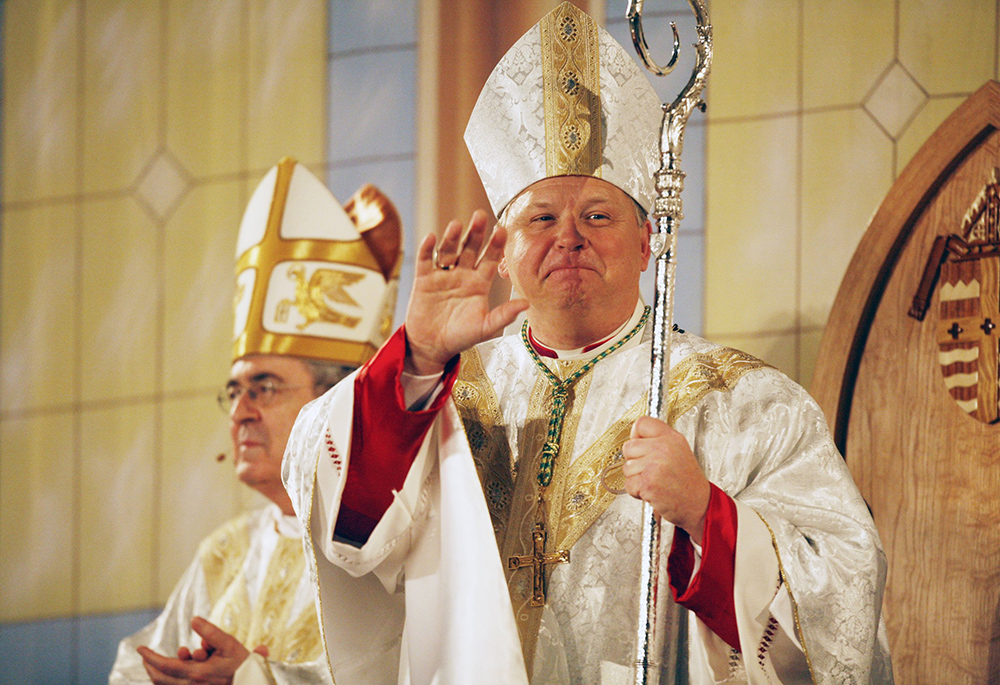
Bishop Richard Stika waves to the congregation during his episcopal ordination March 19, 2009, at the Knoxville, Tennessee, convention center. Stika, a St. Louis native, is the third bishop to lead the Diocese of Knoxville, which was founded in 1988 and is home to almost 60,000 Catholics.. At left is then-principal consecrator Cardinal Justin Rigali of Philadelphia, who is today the retired archbishop of Philadelphia. (CNS/East Tennessee Catholic/Deacon Patrick Murphy-Racey)
Some priests in the Diocese of Knoxville have retired early or left active ministry. Others are considering leaving the priesthood. Groups of lay Catholics in the East Tennessee area say they are demoralized and frustrated.
"We are just really a hot mess," said Susan Vance, a leader of the Survivors Network of Those Abused by Priests in Tennessee.
Vance and other local Catholics blame Bishop Richard Stika, who became the diocese's third bishop in 2009, for the turmoil in their local church. In two lawsuits, the diocese is accused of allegedly obstructing investigations into clergy sex abuse and intimidating people who reported they were abused. An apostolic visitation is investigating concerns about Stika's leadership raised by laity and clergy.
"This man is not a leader. A leader looks after his people," said Marcy Meldahl, a Knoxville resident who served for 10 years as the diocese's human resources director until she resigned in 2014. Meldahl told NCR she left her job amid her concerns that the diocese refused to make improvements to its pension financial reporting procedures, and added that she was being frozen out of meetings toward the end of her tenure.
"The bishop's enablers injected themselves and took over issues they were unqualified for," Meldahl said.
In an interview with NCR, Stika defended his 14-year record as the bishop of the Knoxville Diocese, which he said because of his leadership has grown to more than 75,000 Catholics, has established a half-dozen new parishes, has 13 seminarians preparing for the priesthood, with four being ordained this year, and that this year for the first time has raised more than $3 million in its annual bishop's appeal.
"I see growth, I see financial stability, I see vocations, and I see happiness," Stika said.
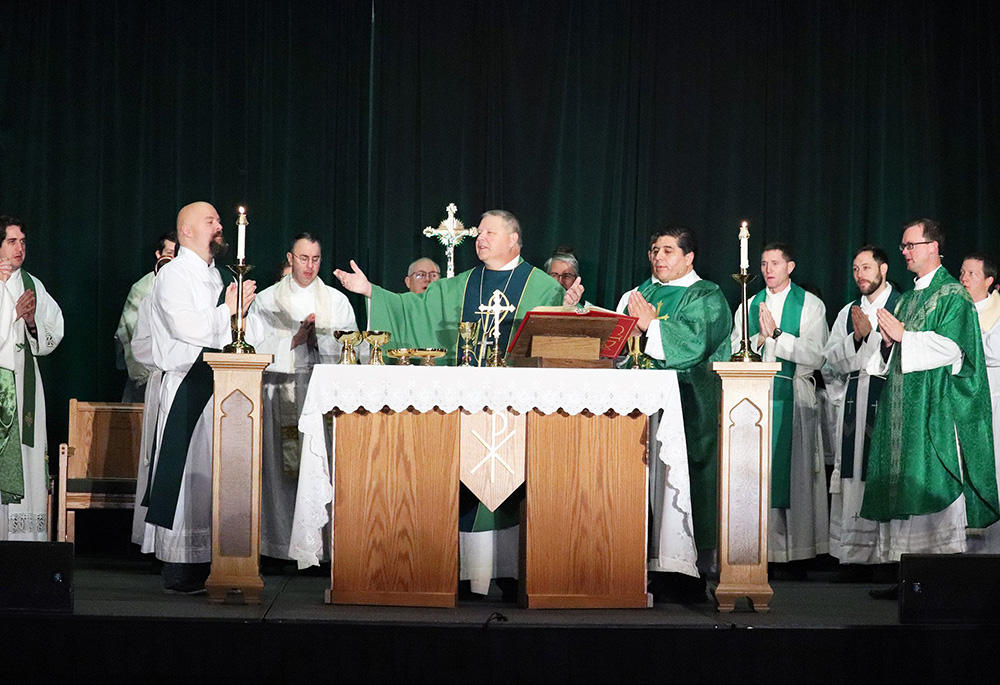
Bishop Richard Stika of Knoxville, Tennessee, celebrates the Feb. 6, 2022, closing Mass for SEEK22 in the ballroom of the Knoxville Convention Center. More than 1,000 participants from 15 campuses in five states attended the Feb. 4-6 Fellowship of Catholic University Students conference. (CNS/The East Tennessee Catholic/Gabrielle Nolan)
But court documents, two letters sent to the Vatican's U.S. embassy, and interviews with a dozen lay Catholics and diocesan priests — six priests spoke to NCR on the condition of anonymity for fear of being retaliated against by their bishop — present a less sanguine situation in the Diocese of Knoxville.
Those interviewed by NCR described Stika as an authoritarian and abusive figure who has bullied priests. They cited court documents that suggest Stika shielded a seminarian with an alleged history of sexually aggressive behavior from accountability when he was accused of sexually assaulting a church employee. They also accused Stika of ignoring or not directly answering their questions about diocesan financial matters or the allegations, detailed in lawsuits, that the diocese tried to obstruct two separate sex abuse investigations. Clergy and laity alike expressed concerns about Stika retaliating against priests who question him or who he suspects of speaking to the media without his authorization.
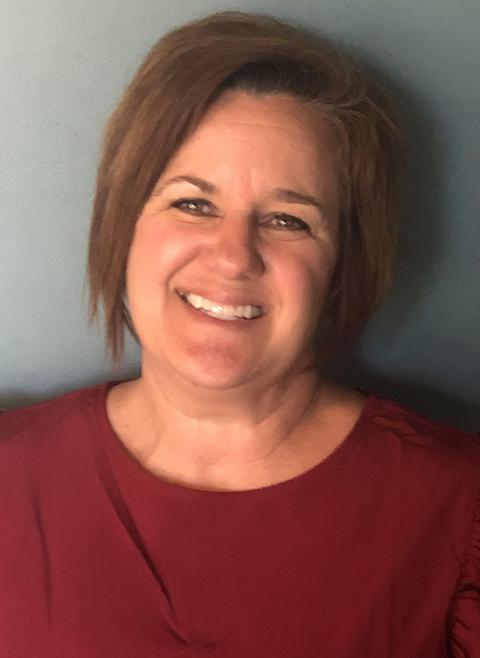
Kristy Higgins (Courtesy of Kristy Higgins)
"I am concerned and bothered by the fact that our parish priests feel so unsupported by [Stika] and feel so scared that if they express that, there would be retribution against them," Kristy Higgins, a Chattanooga resident, told NCR.
Retribution against priests
As an example of suspected retribution, several Catholics in the diocese mentioned Fr. Brent Shelton, a respected priest and one of four diocesan deans who left his thriving Oak Ridge parish on April 25 after being told that he was being reassigned to his choice of two pairs of remote mountain parishes. Shelton filed a complaint against Stika, using the Vatican's Vos Estis Lux Mundi process created by Pope Francis in 2019, that attorneys have subpoenaed in one of the lawsuits. In 2021, sources told NCR, Shelton coordinated a letter to the apostolic nunciature that 11 priests signed, expressing concerns with Stika's leadership.
Vance said she believed Shelton's departure was "the result of Bishop Richard Stika's intimidation and retaliation."
In a letter to St. Mary Church in Oak Ridge announcing Shelton's departure, Stika said the priest had left "without my knowledge and permission." Stika said Shelton had asked him for a leave of absence a few days after the bishop "asked him to consider a new assignment" as part of the diocese's annual review of parish needs.
Several Catholics, lay and clergy, who spoke to NCR did not believe Shelton's transfer was an ordinary assignment.
"You don't take someone from being dean and pastor of a large parish with a school and offer them two small parishes as far away from Knoxville as you can get. How else can you see that other than retaliation?" one senior priest told NCR.
Asked whether Shelton's reassignment was in retaliation for his whistleblowing, Stika told NCR, "Absolutely not." The bishop added that he has "great respect for Fr. Shelton," and said he "proposed" the new assignment and asked Shelton to think about it for a couple of days.
"If he would have said to me, 'I'd like another year or so [in Oak Ridge],' I would have been fine with that," said Stika, who described priest assignment decisions as a "collaborative effort" that takes into account the needs of individual parishes.
"What's the point of retribution?" Stika said. "I'm about bringing the church together. Retribution is just the opposite."
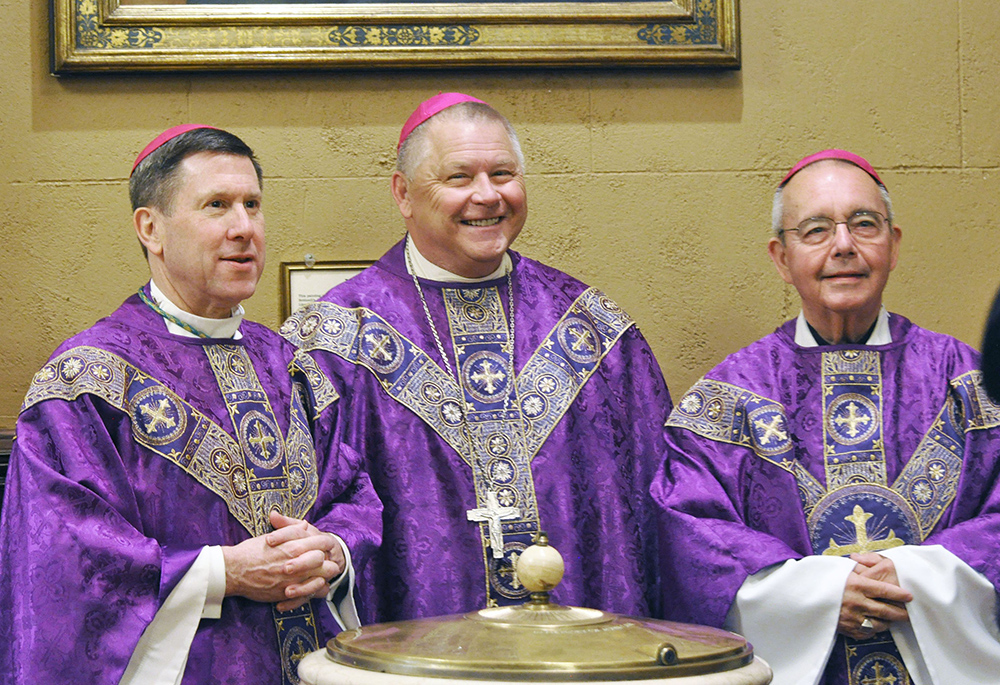
Tennessee Bishops J. Mark Spalding of Nashville, Richard F. Stika of Knoxville and David Talley of Memphis are seen at St. Mary of the Seven Sorrows Church March 23, 2022, in downtown Nashville. The bishops came together to meet with state politicians to talk about issues in line with Catholic social teaching. (CNS/Tennessee Register/Katie Peterson)
However, several priests who spoke to NCR said Stika had called or brought them into his office several times to ask them if they had spoken to the press. One priest who said Stika had questioned him told NCR: "Bishop Stika wants to know who said what, and to whom they said it to. He has demanded that we reveal names of people and other priests who have spoken about him that we may know about, or that there will be canonical consequences."
While saying that he "might disagree with people" from time to time, Stika insisted that he has "never had a sense of retribution."
"I've always had a good relationship with the media," Stika said. "I have great respect for the media. If anybody speaks to the media, I have no problem with that."
Apostolic visitation
Several sources told NCR that an apostolic visitation, conducted by two Virginia bishops, has been investigating the situation in the Diocese of Knoxville. Five priests who said they were interviewed for the visitation told NCR that the bishops asked them questions about diocesan finances, the morale among priests and the diocese's handling of sex abuse cases.
The priests who were interviewed for the visitation also told NCR that Bishops Michael Burbidge of Arlington, Virginia, and Barry C. Knestout of Richmond, Virginia, conducted the investigation. One Knoxville diocesan priest told NCR the bishops "were very professional" in their questioning.
Asked about the apostolic visitation, Stika told NCR that he's heard "rumors," but said he can't be "distracted by rumors and letters. I just have to move forward. My mission is to preach the Gospel."
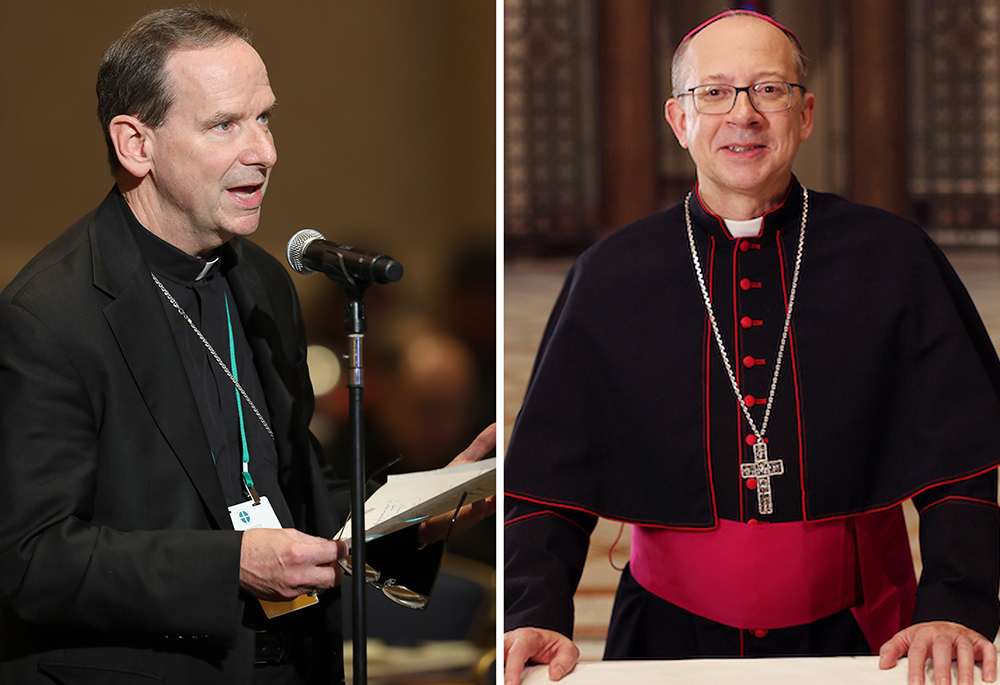
Bishop Michael Burbidge of Arlington, Virginia, and Bishop Barry C. Knestout of Richmond, Virginia, are seen in this composite photo. (CNS composite; photos by Bob Roller and Ian West, Courtesy of Diocese of Richmond)
Stika's comments are in line with how church authorities have responded to questions about the visitation.
A spokeswoman for Louisville, Kentucky, Archbishop Shelton Fabre, the metropolitan archbishop whose ecclesial province includes the Knoxville Diocese, referred questions to the Vatican's embassy in Washington, D.C., which did not respond to an email from NCR requesting information about the visitation.
A spokeswoman for the Arlington Diocese said she was unable to comment. The Richmond Diocese did not respond to a similar request for comment.
The priests who were interviewed for the visitation told NCR they were instructed to sign confidentiality agreements. One priest said he requested a copy of the agreement, but was told the document would be provided to his lawyer.
"There's zero transparency," the priest said.
Several priests and lay Catholics in the Knoxville Diocese told NCR they have not heard anything about the visitation in the five months since the Virginia bishops arrived in Tennessee to interview witnesses from Nov. 28 to Dec. 2.
"To me, the whole thing flies in the face of what Pope Francis has been saying about transparency. It's the old way of doing things," said one of the priests.
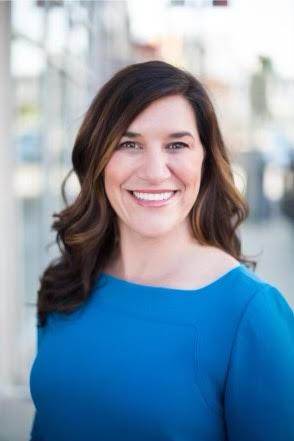
Theresa Critchfield (Courtesy of Theresa Critchfield)
The total silence makes Catholics like Theresa Critchfield, a civil attorney in Chattanooga, Tennessee, who said she does not oppose the use of confidentiality agreements in principle, wonder if church leaders are really using the agreements for the proper purpose of safeguarding an investigation before releasing their findings to the faithful.
"Surely, someone could say something about it," said Critchfield, who helped draft a letter that she and a group of lay Catholics in Chattanooga sent in October 2022 to Fabre, the Vatican embassy and the U.S. bishops' conference.
Critchfield, a practicing Catholic who said she never envisioned herself in a public dispute with her bishop, told NCR she became frustrated in recent years with her concerns about potential financial mismanagement and reading about sexual abuse lawsuits.
"It was just like, you know what, enough is enough," Critchfield said.
While some apostolic visitations in recent years were highly publicized and their final reports made public, such as those of U.S. seminaries in 2005-06 and of U.S. women religious in 2009-2012, it is not unusual for church leaders not to publicly acknowledge visitations of individual dioceses, religious institutes or monasteries, said Mercy Sr. Sharon Euart, a canon lawyer and executive director of the Resource Center for Religious Institutes.
Commissioned by the Vatican, an apostolic visitation "is something that of its nature is confidential but can be made public," said Euart, who is a former associate general secretary of the U.S. bishops' conference.
"It could well be that once the investigation of a particular diocese is complete, there will be a public summary or some aspects of the report made public, but that's going to depend on the nature of the report and the Holy See's response to whatever they have found," Euart told NCR.
Often, apostolic visitations are related to whether someone in leadership, such as a bishop or abbot, is able to govern in "appropriate and effective ways," Euart said.
Mercy Sr. Sharon Euart, executive director of the Resource Center for Religious Institutes (Courtesy of Sharon Euart)
How long an apostolic visitation takes depends on the size of the subject and the scope of the investigation, said Euart, who noted that the visitations of the U.S. seminaries and women religious both took several years. The time frame also depends on the investigation's complexity, especially if officials review internal documents and other records, and which Vatican dicastery will be involved in the final assessment. Euart said the matters that sources told NCR the visitation has been probing in the Knoxville Diocese "suggest a broader consultation even in Rome."
A bishop, a metropolitan archbishop or even groups of the lay faithful can request an apostolic visitation if they have serious concerns about the leadership of a diocese, a seminary, monastery or convent. In recent years, lay Catholics and others circulated a petition calling for an apostolic visitation of Bishop Michael Olson in Fort Worth, Texas, citing concerns over his leadership.
Whether the Vatican ever considered such a visitation was never made public, which Euart said is not uncommon. She told NCR that she knows of apostolic visitations of religious institutes that never became public. "They may happen, and we don't hear about them," she said.
Regarding reports that witnesses in the Knoxville apostolic visitation were told to sign confidentiality agreements, Euart said that may be the bishops' attempt to "avoid misinformation being put out in the public, especially on social media, or information that may be confidential to those who are conducting the visitation."
Calls for transparency
But in the absence of any information, Catholics in the Tennessee diocese are wondering if the church is taking their concerns seriously.
"We want some transparency," said Higgins of Chattanooga. "We want to at least be assured that our concerns have been heard. Even if the answer is that there's nothing to these allegations, that we've investigated and we've determined there's nothing to it. Then great. But give us that, at least. Show us that someone cares about us."
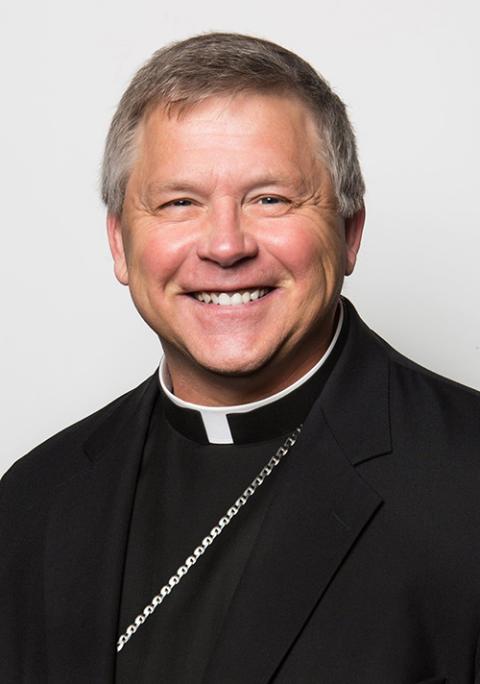
Bishop Richard Stika is pictured in a 2015 photo. (CNS/Courtesy of Diocese of Knoxville)
The priests who spoke to NCR said Stika has told them in several meetings that Archbishop Christophe Pierre, the Vatican ambassador, has assured Stika that he is safe from any ecclesial sanction. In his interview with NCR, Stika said he has had conversations with Pierre in which they discussed the health of the Knoxville Diocese. Stika said the nuncio told him to "continue to be a good bishop."
"And that's what I tried to convey to the priests," Stika said.
Arriving in Knoxville in 2009 from the Archdiocese of St. Louis, Critchfield initially found Stika's informal, somewhat avuncular public persona to be a breath of fresh air.
"I appreciated the down-to-earth approach he had," said Critchfield, who had dinner with the bishop early in his tenure and said she was hopeful that Stika's personality would help connect with people in the pews.
But eventually, Critchfield and others soured on Stika, who as the years passed alienated some priests and laity in East Tennessee with an episcopal style that they described as top-down and closed off from the faithful. They said the bishop's personal behavior at times has been contemptuous, abrasive and uncouth. The 2021 letter that a group of diocesan priests sent to the nunciature mentioned alleged instances of Stika making off-color jokes at inopportune moments.
"I don't believe he's a bad man. He just doesn't have the personality and the tools in his toolbox to be a bishop," a senior priest in the Knoxville Diocese told NCR.
Stika told NCR that he "is sometimes spontaneous with humor," adding that he has to be careful "sometimes people can receive it the wrong way." Stika pushed back, though, against suggestions that he is not responsive to the concerns of local lay Catholics.
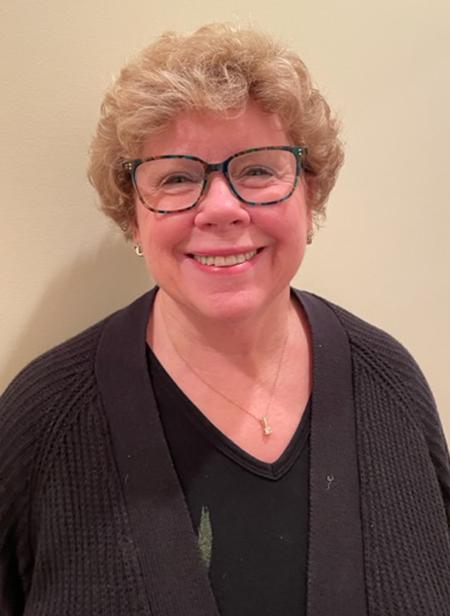
Marcy Meldahl, former human resources director for the Diocese of Knoxville (Courtesy of Marcy Meldahl)
"I have great respect for the laity; if they stop me, I'll stop and talk to anybody," said Stika, who told NCR that he was on track to log 4,200 miles on his car by presiding at confirmation Masses at 36 parishes across the diocese this spring.
"I just love being with people, and that's my mission. I'm not big on desk work," Stika said.
Meldahl, the former diocesan human resources director, described a workplace culture where bullying was "a very big problem." She said Stika and his assistants would respond to employee matters "with a sledgehammer when a scalpel would have been sufficient." A priest told NCR that he had seen Stika yell at priests, call some a disgrace for being heavyset, and verbally abuse one priest to the point that that priest called him in tears after leaving the bishop's office.
Stika told NCR he would never demean a priest for being overweight, and said he believes he has a good rapport with most of the 88 priests in the Diocese of Knoxville.
"Anybody in a position to make decisions is not going to be always understood," Stika said. "My goal is not to placate people. My goal is to bring unity."
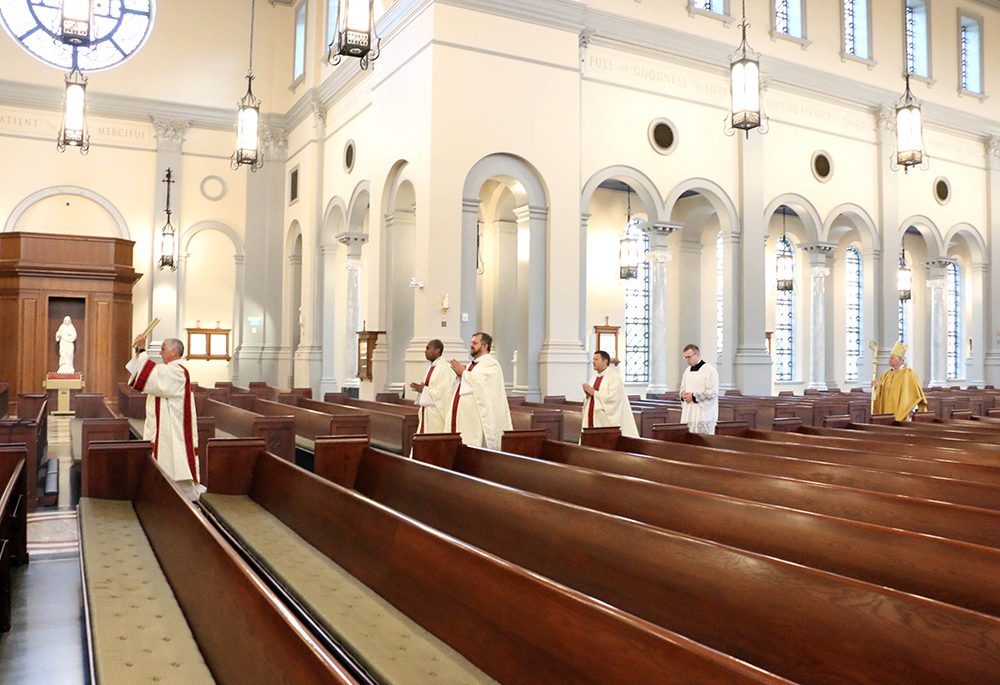
Bishop Richard Stika of the Diocese of Knoxville, Tennessee, far right, processes into the Cathedral of the Most Sacred Heart of Jesus at the beginning of Easter Mass April 12, 2020. (CNS/The East Tennessee Catholic/Bill Brewer)
By 2021, however, that desired unity had become increasingly strained.
A priest who spoke with NCR said he and two other priests in 2021 wrote a letter to the Vatican ambassador detailing their concerns with Stika, which they provided to NCR. This letter, which was the same one Fr. Brent Shelton coordinated, mentioned that "several priests" in the Knoxville Diocese had filed Vos Estis complaints against Stika. The letter also described a "depressed presbyterate" where priests who were demoralized by Stika's leadership were "seeing psychologists, taking antidepressants, considering early retirement and even looking for secular careers."
One of the priests who wrote the letter told NCR that 11 priests signed it. The priests who spoke to NCR said they never received a response or acknowledgement that the nuncio received their letter.
"I'm deeply discouraged by a church that lets these things happen, that would let a man like Stika become a bishop in the first place, and leave him here for 14 years, especially after all this," said the priest who filed the Vos Estis complaint.
Sexual abuse lawsuits
In February 2022, a musician who worked at Knoxville's Cathedral of the Most Sacred Heart of Jesus filed a lawsuit where he accused a now former seminarian of sexually harassing and raping him in 2019. The lawsuit said Stika tried to impede the diocesan investigation by firing the original investigator when the person began looking into the case.
A former member of the Knoxville Diocese's review board told NCR that Stika told the board that the investigator had been "asking too many questions" and making staff members at the chancery upset. The former member, who spoke on the condition of anonymity to discuss internal conversations, said the board was "very upset" with the bishop.
In an April 11 court filing responding to the former musician's complaint, the diocese denied the allegations that it tried to obstruct the investigation concerning the seminarian. The diocese also disputed the musician's claims that the seminarian had been removed from SS. Cyril & Methodius Seminary in Michigan and from the Jesuits for sexual misconduct.
However, in the same filing the diocese did not dispute the lawsuit's claim that Stika told groups of priest in two separate meetings in 2021 that the musician had actually groomed and "victimized" the seminarian. The former musician cites those comments in accusing Stika of defaming and trying to intimidate him. In answering the musician's allegation, the diocese said the bishop's comments "accurately reflected his opinion and understanding of the underlying circumstances and events based upon the information that was available to him at the time."
The former seminarian did not respond to NCR requests for comment.
Advertisement
Stika's close relationship with the former seminarian, who arrived in the United States from Poland in 2018 to study for the priesthood in the Knoxville Diocese, continues to mystify local clergy and laity.
According to court documents, both sides agree that the seminarian moved into the bishop's residence in February 2019, traveled with Stika and Cardinal Justin Rigali — who lives in Stika's residence — to the Vatican in December 2019, assisted Stika and Rigali at Mass in August 2020, and in February 2021 assisted at a Mass celebrating the 35th anniversary of Stika's ordination.
The diocese's court filing acknowledges that the seminarian left seminary in March 2021 and accompanied Stika and Rigali on trips they took that summer to Michigan and New York.
"No other seminarian I know was given those kind of favors," said one priest, who provided NCR a copy of an August 2021 letter from Stika to St. Louis University in which the bishop said the Diocese of Knoxville would pay the $48,258 for tuition, room and board, and other living expenses that the former seminarian would be incurring as a student that fall at the university.
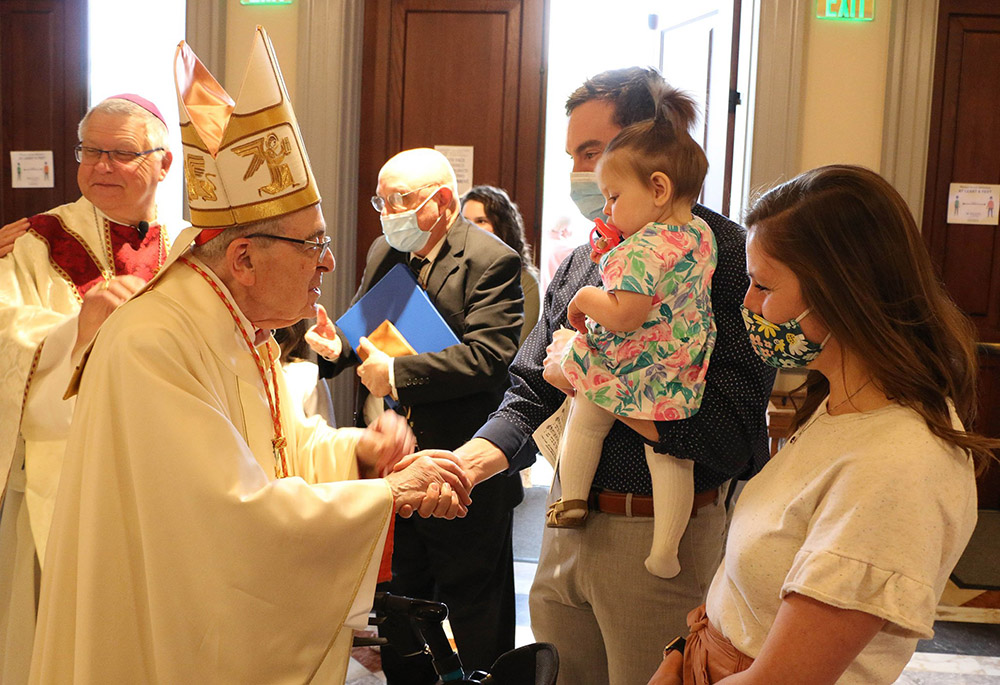
Cardinal Justin Rigali, retired archbishop of Philadelphia, greets parishioners at the Cathedral of the Most Sacred Heart of Jesus in Knoxville, Tennessee, after a Mass marking the 60th anniversary of his priestly ordination April 25, 2021. At left is Knoxville Bishop Richard Stika. Since his retirement in 2011, Cardinal Rigali has been in residence with Bishop Stika. (CNS/The East Tennessee Catholic/Bill Brewer)
Stika declined to comment on matters concerning the former seminarian and the lawsuit, citing the pending litigation.
"I can't speak about the lawsuit. I have great faith in our legal system, so I look forward to the outcome," Stika said.
Meanwhile, another lawsuit, filed in federal court in November 2022, accuses the Knoxville Diocese of hiring an investigator to discredit a Honduran woman who accused a diocesan priest of sexually assaulting and battering her. The lawsuit also alleges that the diocese's clergy abuse review board did not properly investigate her claims against the priest, who has since been criminally charged on two counts of sexual battery.
The diocese has not formally responded to the woman's complaint. A diocesan spokesman told NBC News in November 2022 that the accused priest had been removed from ministry, and that the diocese would not comment on the lawsuit while it was being litigated. In March, a judge ordered the woman's lawsuit to be stayed while the priest faces criminal charges for the alleged sexual battery.
The lawsuits and media coverage that delved into the diocese's handling of sex abuse cases angered local Catholics such as Higgins and Critchfield, who worked together with other Catholics to draft their September 2022 letter to the Vatican ambassador. Almost 600 people have signed the letter since Critchfield posted it online at Change.org last November.
"There's so much frustration and discontent here," Critchfield said. "I would love to see a diocese united together behind a bishop that everyone loves. But the fact that our priests are afraid to speak out is not OK. A hostile work environment is not OK."
In early April, Critchfield and Higgins told NCR that the diocese arranged a private meeting between them, two other lay Catholics and Stika. During the meeting, they said Stika was defensive and critiqued everything he thought was wrong with their letter while defending his job performance.
"I don't know if anything came of it," said Critchfield, who added that Stika told them toward the end of the meeting, "I hear you."
"I hope he mulls it over and really reaches the point where he understands what it is we've all been saying," Critchfield said. "I'm doubtful that's going to happen, simply because of what we've seen in the past, and because of his defensive attitude throughout the whole meeting."
Stika said he thought he had a "good meeting" with Critchfield, Higgins and the other lay Catholics, adding that he thought he had been "very positive" and eager to hear what they wanted to say. Stika added that he values "talking to people, listening to them and dialoguing."
"I love being the bishop of a small diocese," he said. "I love being a priest. I just love people. And sometimes you're just taken the wrong way."






